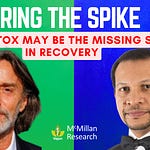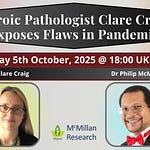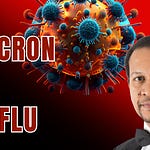Although not hard to believe, recent studies from the USA indicate that trust in doctors has plummeted by about 30% since 2020, all because of COVID-19. This dramatic decline is astounding and raises important questions about what happened and how we can rebuild this trust, which is crucial for the effective interaction between patients and clinicians.
Today, I want to briefly discuss a recent paper with the help of Dr. Goddard, who kindly agreed to join me on short notice. He hasn't even seen the paper yet but will provide valuable perspective. Before we dive in, I'd like to quickly mention our upcoming newsletter and the free ebook on nitric oxide available through the link in the description.
Also, stay tuned for our upcoming series, "Navigating the COVID Storm: Therapeutic Options," which delves into the spike-triggered autoimmune response mechanism—a concept worth reflecting on.
Navigating the Covid STORM – Therapeutic Options
Webinar - Thursday 8th August, 2024 at 7PM UK time
A recent JAMA paper examined trust in physicians and hospitals during the COVID-19 pandemic through a comprehensive 50-state survey in the USA, involving about 400,000 respondents aged over 18. The findings are striking: the proportion of adults with high trust in physicians and hospitals dropped from 71% in April 2020 to 40% in January 2024. This significant decline is troubling.
Dr. Goddard, seeing these numbers for the first time, pointed out that while the study is based in America, its findings may not fully extrapolate to the British context due to differences in healthcare systems. In the UK, the NHS predominates, with a small private sector, contrasting sharply with the insurance-based, private healthcare system in the USA.
Interestingly, the study revealed gender and age-related differences in trust. Women, even early on, started to lose trust more significantly than men. Trust also varied by ethnicity but followed a similar downward trend across all groups. However, the most concerning drop was among those over 65, whose trust plummeted from over 80% to almost 50% by 2024. This age group, with significant interaction with the healthcare system, reflects a deeply worrying trend.
Financial motives over patient care emerged as a prominent theme in the survey comments. Respondents perceived healthcare as profit-driven, where financial incentives often outweighed patient welfare. This perception significantly changed during the pandemic, potentially due to the protocols, vaccine mandates, and overall healthcare policies implemented in response to COVID-19.
Dr Goddard highlighted that it is essential to address the methodological flaws in the study's survey questions. Combining trust in both people and organizations in a single question can lead to ambiguous interpretations. Additionally, comments about poor quality care, negligence, and dismissive attitudes from healthcare providers highlight a significant issue in patient-clinician relationships.
The pandemic exposed a gap between public expectations and the reality of medical knowledge. Initially hailed as heroes, clinicians later faced public scrutiny as the complexities and uncertainties of COVID-19 unfolded. This shift underscores the need for clinicians to be patient advocates, continuously questioning and advocating for patients rather than appearing as pharma advocates.
The influence of external entities, such as pharmaceutical companies and government bodies, further eroded public trust. The perception that healthcare decisions were unduly influenced by these entities led to suspicions of dishonesty and withholding information. Clinicians' silence or perceived silencing during the pandemic fueled these suspicions.
The challenge now is to rebuild trust. We must acknowledge the limitations and uncertainties in medical knowledge, especially during unprecedented events like a pandemic. Transparent communication, patient advocacy, and fostering a culture of creativity in medical practice are crucial steps in restoring public trust.
As we navigate the ongoing challenges of COVID-19 and its aftermath, let's commit to rebuilding trust through open dialogue, patient-centered care, and a relentless pursuit of solutions. Thank you for joining me on this journey. Let's continue to build the science and find answers together.
Please support my research efforts by subscribing to Vejon Health Substack. Your support allows me to continue bringing you my insights in a timely and effective way.











